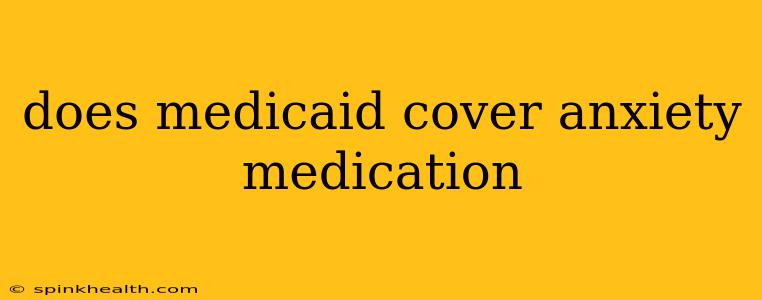Does Medicaid Cover Anxiety Medication? Navigating the Maze of Healthcare Coverage
The flickering fluorescent lights of the doctor's office hummed, a counterpoint to the frantic beat of Sarah's heart. She'd finally taken the plunge, scheduling an appointment to address the crippling anxiety that had been shadowing her for months. But a new worry crept in: would her Medicaid coverage extend to the medication she might need? This is a question many grapple with, and the answer, unfortunately, isn't a simple yes or no.
Medicaid, a joint state and federal program, aims to provide healthcare access to low-income individuals and families. However, the specifics of what's covered can vary significantly depending on your state of residence and the specific plan you're enrolled in. While Medicaid generally covers essential healthcare services, the inclusion of anxiety medication falls into a nuanced grey area.
What Medications Does Medicaid Typically Cover for Anxiety?
Medicaid typically covers medications included on its state-specific formulary. This formulary is a list of prescription drugs that the plan will cover, and its contents can change over time. Commonly prescribed anxiety medications, such as selective serotonin reuptake inhibitors (SSRIs) like sertraline (Zoloft) or escitalopram (Lexapro), and serotonin-norepinephrine reuptake inhibitors (SNRIs) like venlafaxine (Effexor), are often included. However, newer or more specialized medications might require prior authorization or might not be covered at all.
What Factors Influence Medicaid Coverage of Anxiety Medication?
Several factors can impact whether your Medicaid plan covers anxiety medication:
- State Variations: Each state administers its Medicaid program with varying levels of coverage. Some states may have more restrictive formularies than others.
- Specific Plan: Even within a state, different Medicaid plans can have different drug coverage. Your individual plan's details will determine what's covered.
- Prior Authorization: Many plans require prior authorization for certain medications, especially newer or more expensive ones. This involves obtaining approval from your health plan before filling the prescription. The process can be time-consuming, requiring additional paperwork and potentially delaying access to medication.
- Generic vs. Brand-Name: Medicaid often prioritizes generic medications due to their lower cost. If your doctor prescribes a brand-name medication, you might encounter coverage issues or need to explore generic alternatives.
How Can I Find Out If My Medicaid Plan Covers Anxiety Medication?
Determining coverage is the first and most crucial step. Here’s how to find out:
- Review your plan's formulary: Your Medicaid plan's website will usually provide access to its formulary, a comprehensive list of covered drugs.
- Check your Member Handbook: This handbook contains detailed information about your plan's benefits and coverage.
- Contact your Medicaid provider: Don't hesitate to call your Medicaid provider's customer service number to inquire directly about coverage for specific medications. They can confirm coverage and explain any prior authorization requirements.
- Talk to your doctor or pharmacist: Your healthcare providers are valuable resources. They can help you navigate the complexities of medication coverage and explore alternative options if necessary.
Does Medicaid Cover Therapy for Anxiety?
While this article focuses on medication, it's important to note that many Medicaid plans also cover therapy for anxiety. Therapy, often in conjunction with medication, can be highly effective in managing anxiety disorders. Check your plan's benefits for details on mental health services.
What if My Medicaid Doesn't Cover My Anxiety Medication?
If your Medicaid plan doesn't cover your prescribed medication, there are several options you can explore:
- Appeal the decision: If you believe the decision to deny coverage was made in error, you have the right to appeal. Your plan should outline the appeal process.
- Explore generic alternatives: Switching to a generic version of the medication can significantly reduce costs.
- Apply for assistance programs: Several pharmaceutical companies offer patient assistance programs that help reduce medication costs for those who qualify.
- Seek assistance from a patient advocate: These advocates can help navigate the complex healthcare system and assist you in obtaining the medication you need.
Sarah, armed with this information, felt a wave of relief wash over her. The uncertainty was still present, but now it was coupled with a sense of empowerment and a clear path forward. Navigating Medicaid coverage can be complicated, but with the right resources and information, you can successfully access the care you need. Remember, your mental health matters, and seeking help is a sign of strength, not weakness.

